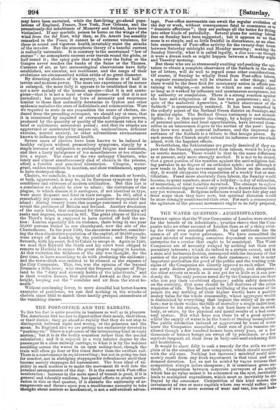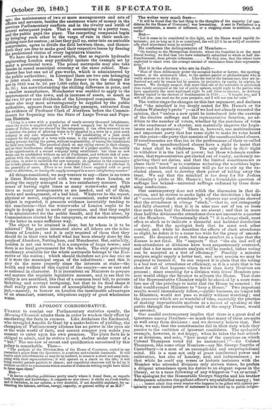THE WATER QUESTION: ADMINISTRATION.
THEORY opines that the Water Companies of London were created for the benefit of its inhabitants practice shows that the Com- panies take no other account of London than as of a thing exist- ng for their own peculiar profit. In that antithesis lies the essence of all our water grievances. We have committed the grand mistake of rendering ourselves dependent on commercial enterprise for a service that ought to be municipal. The Water Companies are of necessity swayed by nothing but their own pecuniary interests ; which do indeed to a certain extent, and in a rude and barbarous fashion, correspond with the interests of that portion of the population who are their customers ; but in many important particulars the good of the public and the trading prin- ciples of the Companies are directly opposed to each other. The one party desires plenty, constancy of supply, and cheapness ; the other extorts as much as it can get for as little as it can pru- dently do. The only persons cared for by the Companies are those who can pay their exorbitant charges ; public safety demands, on the contrary, that none should be left destitute of the prime requisites of life. The health and wellbeing of the meanest of the people (to say nothing of their higher worth) have a positive money value for the whole community, whose aggregate wealth is diminished by everything that impairs the utility of its mem- bers ; nor is there within the bills of mortality a single individual, whatever be his station, who is not hurt more or less in mind, body, or estate, by the physical and moral results of a bad sana- tory system. But what hope can there be of a good system, whilst the supply of water is in the hands of trading monopolists? The public calamities induced or aggravated by want of water leave the Companies unscathed ; their rate of gain remains un- altered though a few hundred houses burn every year, or a few thousands of human beings are swept off by pestilence, or a few myriads languish all their lives in body-and-soul-sickening filth and brutishness.
It would be sheer folly to seek a remedy for the evils we com- plain of in the creation of new companies, which should compete with the old ones. Nothing but increased mischief could ulti- mately result from any fresh 'experiment in that tried and con- demned direction. Let us not be misled by vague notions that competition always infers cheapness ; it is sometimes gross un- thrift. Competition between corporate purveyors of an article which has no value unless it be consumed on the spot, inevitably leads to multiplied expenditure, which must as inevitably be de- frayed by the consumer. Competition of this kind means the investment of two or mom capitals where one would suffice ; the creation of two or more sources of wear and tear, loss and leak-
; the maintenance of two or more managements and sets of Seers and servants, besides the enormous waste of money in the previous parliamentary conflicts and in the rivalry and strife of veral subsequent years.That is economizing to a pretty tune, and d the public pays the piper. The competing companies begin
bringing i each other to the verge of ruin n their neck-or- thing race for custom ; at last they pull up, enter into an amicable compromise, agree to divide the field between them, and thence- forth they are free to make good their respective losses by fleecing the predestined victim of every legislative blunder.
We have shown in a former article, that as regards hydraulic engineering London may profitably imitate the example set by many a provincial town. The proud metropolis may also take lessons in sound municipal economy at the same school. Man- chester has but one set of gas-works, which is administered by the public authorities; in Liverpool there are two sets belonging to joint stock companies. In the former town the charge for gas in 1842 was 5s. 2d. per 1,000 cubic feet, in the latter it was 6s. 2d.; but notwithstanding the shilling difference in price, and a smaller manufacture, Manchester was enabled to apply to the improvement of the town, and in increase of assets, as much as the two 10 per cent dividends of the Liverpool companies. That water also may most advantageously be supplied by the public authorities, appears from the following passages, extracted from the evidence of Professor Clark of Aberdeen before the Commis- sioners for Inquiring into the State of Large Towns and Popu- lous Districts. "Living in a town with a population of nearly seventy thousand inhabitants, where the water is supplied not by a joint stock company but by the Commis- sioners of Police, who are elected by the ratepayers, it has often occurred to me to question the policy of allowing water to be supplied to a town by a joint stock company in any case whatsoever. * * " The establishing of a joint stock company for the supply of a town with water, is the establishing a monopoly of trading persons having the power, without responsibility, of taxing the inhabitants for their own benefit. The practical check on any crying excess in their charge, and on their heedlessness about supplying water of a proper quality, lies mainly in the apprehension of a second company being established: but since no new works can be established without an act of Parliament, and without risk of com- petition with the old company, such as almost always proves ruinous to hoth- ead since, in order to establish the new company, an agitation in the community has to take place—the check is not of a desirable kind; neither is it effectual in the generality of cases. There is no town that I know supplied with so good water as Aberdeen, or having the supply managed ire a more satisfactory manner."
All things considered, we may venture to say—there is no town in Great Britain supplied with worse water than London, or haying the supply managed in a less satisfactory manner. This comes of having eight times as many waterworks and eight times as many managements as are needed, and all of them, works and management, of a bad kind. Whatever be the aspect, physical or moral, engineering or economical, under which the subject is regarded, it presents evidence invariably tending to this conclusion—that the waterworks of London ought to be single in design and in mode of operation, and that they ought to be administered for the public benefit, and for that alone, by Commissioners elected by the ratepayers, or else made responsible to the latter in some sufficient way.
The object to be attained is clear, but by whom is it to be achieved ? The parties interested above all others are the inha- bitants of London; and it is only required of them that they should do in their own behalf what has been already done by the people of Aberdeen, Nottingham, and Manchester. But, unluckily, London is not one town ; it is a congeries of large towns ; and there is no local government for the whole. The only governing machinery available for the whole metropolis belongs to the Exe- cutive of the nation ; which should therefore act pro hac vice as if it were the municipal organ of the inhabitants : and this it may do the more properly since the interests at stake—the health and welfare of this capital of the empire—are so vast and so national in character. It is incumbent on Ministers to prepare and mature the requisite legislative measure, and to see that its utility is not sacrificed, like that of a common local bill, to private bickering and corrupt intriguing, but that in its final shape it ?hall really prove the means of accomplishing its professed ob- ject,—namely, to bestow on London the inestimable advantages of an abundant, constant, ubiquitous supply of good wholesome water.

























 Previous page
Previous page